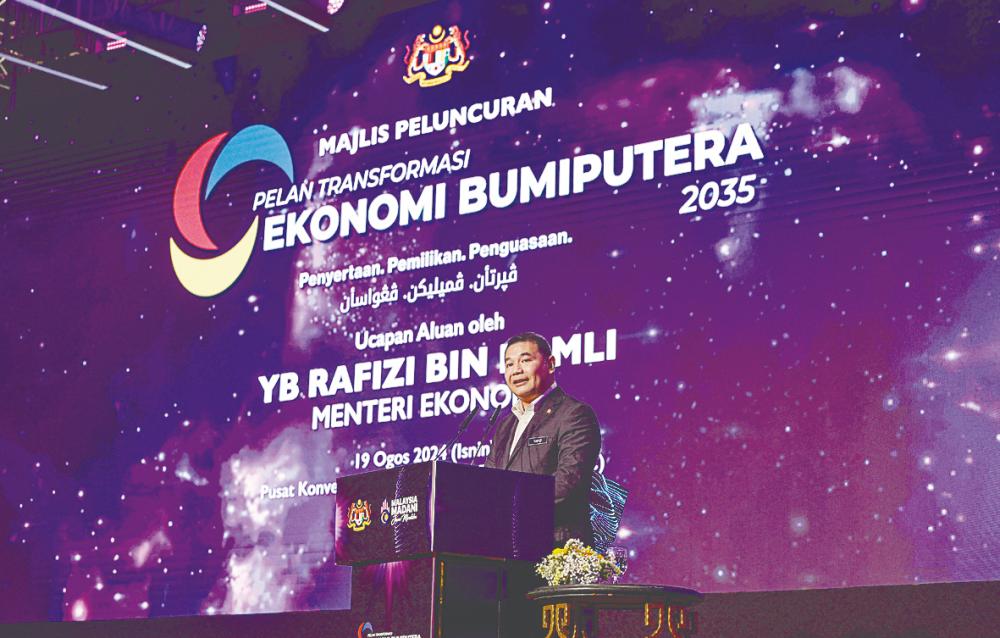PUTRAJAYA: The government aims to increase the contribution of Bumiputera companies to Malaysia’s gross domestic product (GDP) to 15% by 2035 from 8.1% in 2022 under the Bumiputera Economic Transformation Plan 2035 (PuTERA35).
In addition, the target for Bumiputera participation and control through government-linked companies and government-linked investment companies equity is increased to 20% by 2035, up from 18.7% in 2020.
Economy Minister Rafizi Ramli said the Unity Government is committed to ensuring that the Bumiputera agenda continues to be prioritised in every socio-economic development plan of the country.
“There is still room and opportunity for us to reflect and strive to find the best solutions so that the socio-economic status of the Bumiputera community becomes more advanced and prosperous.
“This can be achieved through structural economic reforms aimed at making Malaysia a developed and high-income country. Bumiputera have the opportunity and potential to play a more significant role in new sectors and industries with high added value, including high-growth high-value (HGHV) industries,” he said at the launch of PuTERA35 here today.
However, he added that this will in no way deny the rights of other races. Instead, it will be able to bring benefits to all races in terms of the country’s development and progress.
At the launch, Rafizi said the new direction of Bumiputera economic development – PuTERA35 – is a step to elevate the status and dignity of Bumiputera.
“This plan outlines three pillars that align with the Madani Economy: first, strengthening the nation’s economic foundation; second, enhancing governance and institutional integrity; and third, upholding social justice.”
However, he said, while the government may have excellent plans, what is crucial is the efficiency of implementation for the effectiveness of the devised plans.
“Last Friday, we heard the message from the honorable prime minister that each of us must have a strong commitment to improve productivity and efficiency, and be ready to implement changes to enhance the country’s competitiveness,” Rafizi said.
He added that the government’s shared hope is that the Bumiputera Economic Transformation Plan 2035 will produce a generation of Bumiputeras who are positive, progressive, and innovative, capable of competing not only at the domestic level but also on the international stage.
According to the government, PuTERA35’s preparation considered inputs from the 2024 Bumiputera Economic Congress, involving the efforts of stakeholders from the public and private sectors, including non-Bumiputera groups.
The government said PuTERA35 does not replace existing development plans but is developed as a continuation of the government’s policies and directions in line with the Madani Economy: Empowering the People, and aligned with the 2030 Sustainable Development Agenda (Agenda 2030) to elevate the dignity and status of the people.
It said although previous Bumiputera empowerment policies and plans have yielded some results, much work remains to address various global, regional, and national issues and challenges.
“Domestic issues and challenges were also considered in developing the PuTERA35 roadmap to prepare Bumiputeras to contribute to national development towards achieving high-income economic status,” it said.
The government pointed to the challenges facing Bumiputeras in making contributions to national socio-economic development. The issues include competitiveness, equity ownership, and success creation, education, talent, institutional and governance weaknesses, and incomplete social protection.
It said the Bumiputera development agenda over the past six decades has focused on poverty eradication and societal restructuring; addressing income disparities; equity and property ownership; and enhancing the competitiveness of Bumiputera enterprises.
However, it said, structural issues such as widening income and wealth gaps between ethnicities; the socio-economic status of Bumiputeras trapped in the middle and lower classes; and Bumiputera participation concentrated in low-value-added economic activities still persist.
The government said the approach in monitoring PuTERA35’s implementation involves a top-down method by the Ministry of Economy and a bottom-up method by the Bumiputera Agenda Empowerment Unit (UPAB).
It said UPAB’s role will be strengthened and given responsibility for implementing and closely monitoring the initiatives at the ministry and agency levels. “The PuTERA35 Monitoring Dashboard is also developed to ensure that the 132 initiatives under the three Pillars and 12 Drivers can be implemented by the responsible ministries and agencies.”









